From Property to Prosperity

Robert Shemin believes anyone can corner the market, and participants of his course are sold

Photos: Avi Gass
When my sons were mesivta age and my non-Orthodox parents would come visit, they always seemed baffled by the amount of time the boys spent on limudei kodesh. Realizing limudei chol only took place a few hours a day, my father a”h would start to look worried.
“How are they going to be able to support a family one day?” he’d ask.
How indeed? Even in frum circles, where prioritizing Torah learning is a given, the question lingers. Many people are unable or unwilling to earn a professional degree. Where does that leave the people who lack formal schooling but need to put bread on the table for their families?
Robert Shemin, real estate investor and educator extraordinaire, has a solution. It’s called Project X, and it’s both a crash course in real estate and a lifelong connection to professional guidance and networking.
Robert’s a Jewish boy from Nashville, although his parents weren’t religious and didn’t send him to yeshivah. They sent him to public school, but even there he struggled — he had dyslexia.
“I can read but I can’t type,” he says in Successful Real Estate Investing (John Wiley, 2004). “I also have no sense of direction; I can’t read a map, I can’t put a three-year-old’s toy together. I have no spatial abilities.”
He graduated high school at the bottom of his class. Today, however, he’s worth megabucks.
In his thirties, after making a fortune in real estate, he decided to pay it forward by educating others how to succeed as he did. He began writing books and offering seminars to share the tricks of the trade, and giving lectures in countries all over the world.
One of those countries on his lecture circuit is Israel. Shemin began offering his course to groups of chareidim in Jerusalem some years ago. One father and son team, Zevi and Simcha Bennet, enjoyed such success that they approached Mishpacha to help spread the word to other segments of the frum community and create a Project X course tailored for them. This past March, Shemin and his colleagues came to the Ramada Inn in Toms River to present a full-day introduction to his method and Project X, along with the Bennets and Mishpacha publisher Eli Paley and staff.
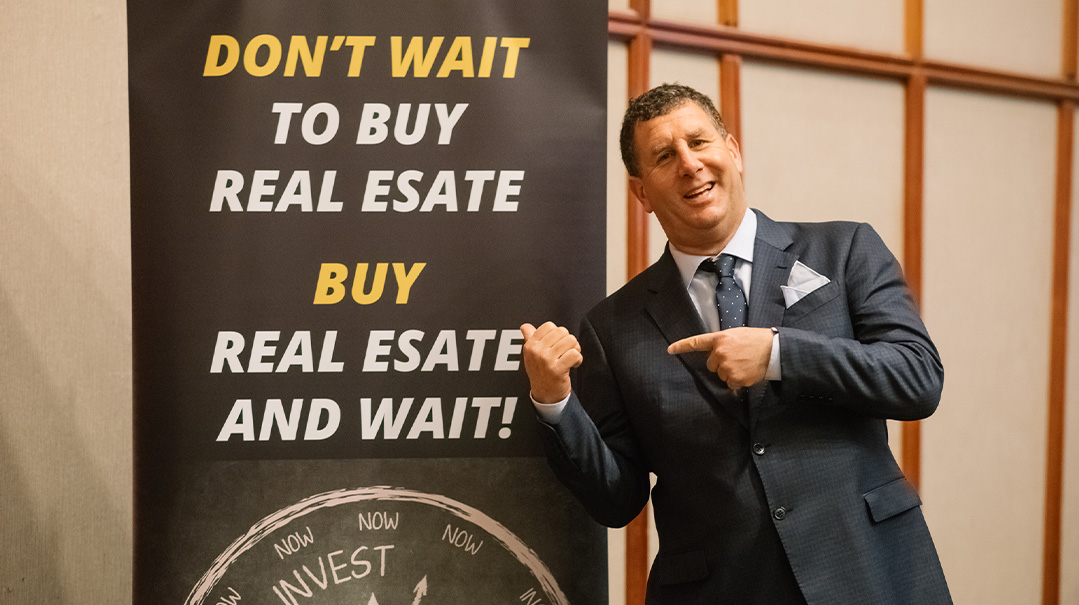
Robert Shemin, a “Jewish boy from Nashville,” enjoys recounting the story of his unexpected path to success in real estate
Meet Robert Shemin
Robert Shemin’s experiences in Israel had left him well prepared to face a room of 150 frum people in Lakewood, mostly men, although there was a small contingent of women as well. A tall, solidly built man approaching 60, with short curly hair and a Jewish face, Shemin is a born salesman: He knows how to connect with his audiences, projecting a folksy, friendly persona that seems genuine enough.
Shemin enjoys recounting his own unexpected path to success. As a young man selling financial products for a living, he was once sent to a sweet elderly couple in a “dumpy old home office” with a battered pickup truck outside. The office didn’t even have a computer. Robert automatically assumed this unsophisticated-looking couple was living on the poverty line and wouldn’t have the means for the financial services he was peddling. Then they offered to show him their accounts.
This unprepossessing couple owned 120 houses free and clear. They were netting $60,000 per month in income, and spent six months a year vacationing. Their fortune was relatively recent, as they’d only begun investing in their fifties.
The husband looked Robert in the eye and asked, “How’s your job?”
Robert’s eyes opened wide. He realized the path to wealth lay in entrepreneurship and ownership, not working for a salary — even a good salary, as he later discussed in a book entitled How Come That Idiot’s Rich and I’m Not? He spent the next year following the man around and educating himself about real estate. Then he began to buy. He had no credit, and little cash. He found a way around that too, through partnering and tapping into other people’s money. The following year, he bought 12 duplexes. From there, his empire exploded.
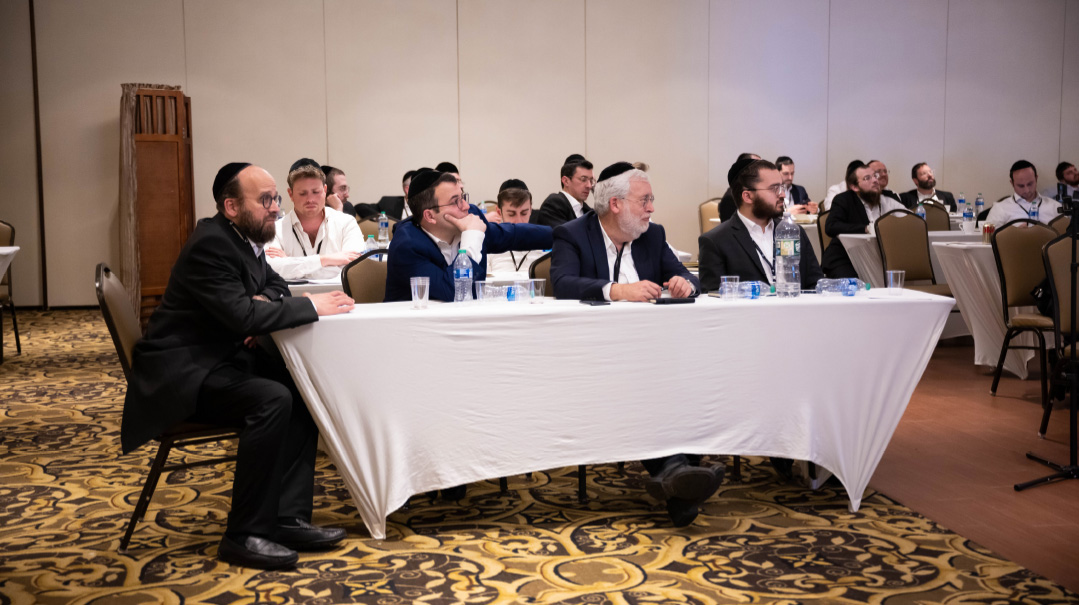
The Shemin Method
When we arrived at the seminar, delayed a bit by traffic, Robert had begun the seminar and was speaking about ways to ferret out properties that would be good investment opportunities.
For investors, he explained, the best low-hanging fruit are “motivated sellers.” These are people with homes in foreclosure or probate, or who need to sell quickly (the children of a deceased person frequently want to get rid of their parents’ house as expeditiously as possible, ditto divorcing couples). Financially strapped homeowners don’t want to go into foreclosure, which is more damaging to a credit score than a bankruptcy, so many would rather sell cheap than foreclose. And banks don’t want the burden of assuming a foreclosed property, and will sometimes lower or modify the original loan to avoid the hassle of taking it on.
“Most sellers are not motivated,” points out Chad McCall, a tall, laid-back looking man in jeans who is Shemin’s co-instructor. One of Robert’s most successful students, Chad now works with him and is a real estate mogul in his own right (last year he averaged about a deal a day). “I mostly look for foreclosures, someone who’s sick or died, or can’t pay real estate taxes,” Chad continues. “But you do have to talk to a lot of people to find these sellers.”
You can also seek out lists of bankruptcies and foreclosures for discounted properties.
Before Shemin’s seminar, I’d always assumed investing in out-of-state properties would require physically traveling to the area to see the house or building and check it out. Surprisingly, Robert assures us that this is no longer necessary. You can look at properties online, displayed by brokers (including visual tours) or on Google Earth. You can make the offers and do all the paperwork online and/or on the phone. You can even close on a house using Zoom and an electronic signature.
Robert does qualify that it’s important to get a sense of the area you hope to invest in. Some markets are glutted.
“I don’t invest in Dallas anymore,” Robert says. “It’s a hot market, it’s too busy. I won’t buy in Santa Monica either.”
Some states, such as Ohio, New York, and New Jersey, have laws that are unfriendly to landlords. New Jersey also has very high real estate tax rates.
“Every lender and every micro market is different,” Robert says. “You have to learn the local laws and know how to get the right permits to make repairs.”
Robert believes in jumping in fast and finishing the research later. Make your offer, get it accepted, then grab that window of time before the closing to do the inspection, assess repairs and renovations that need to happen, and decide if it’s worth it.
“Ninety percent of deals are renegotiated,” he states.
Since investors often buy properties to fix and resell, it’s essential to team up with a trustworthy, competent contractor to get the repairs done.
“You need someone who’s an expert,” Robert says. “For example, they need to be able to identify if the home was built with Chinese drywall, which is cheap and substandard and has to come out.”
He suggests looking at Craigslist, Angie’s List, the local branch of the National Association of Home Builders , or relying on word of mouth from reputable sources to locate honest, qualified professionals.
“Look at the last three jobs they did,” he suggests. “You can look on Zillow to see which properties just got fixed and by whom.”
He adds that contractors are often good potential partners for real estate deals. They know the territory, how to assess the value and repairs of a property, and often have cash on hand.
Once you’ve acquired a property, you have different options for fructifying the investment. You can flip it shortly afterwards — short-term deal, high return on investment, and low to medium risk. Or you can rent the property long term, also a high return on investment and low risk.
Chad, who deals with some high-profile clients, has been known to make money “rescuing” clients teetering on the brink of foreclosure. The manager of a top-tier boxing champ was 30 days away from foreclosure on his $3 million house when Chad offered to buy the house from him and rent it back to him. The rent covered Chad’s mortgage payments, and when the man’s client later brought in prize money from fights, Chad gave his manager the option to buy it back (at a profit, of course).
“Chad’s intention was to help him out,” Robert says. “The guy got to keep his house, and Chad made money and connections.”
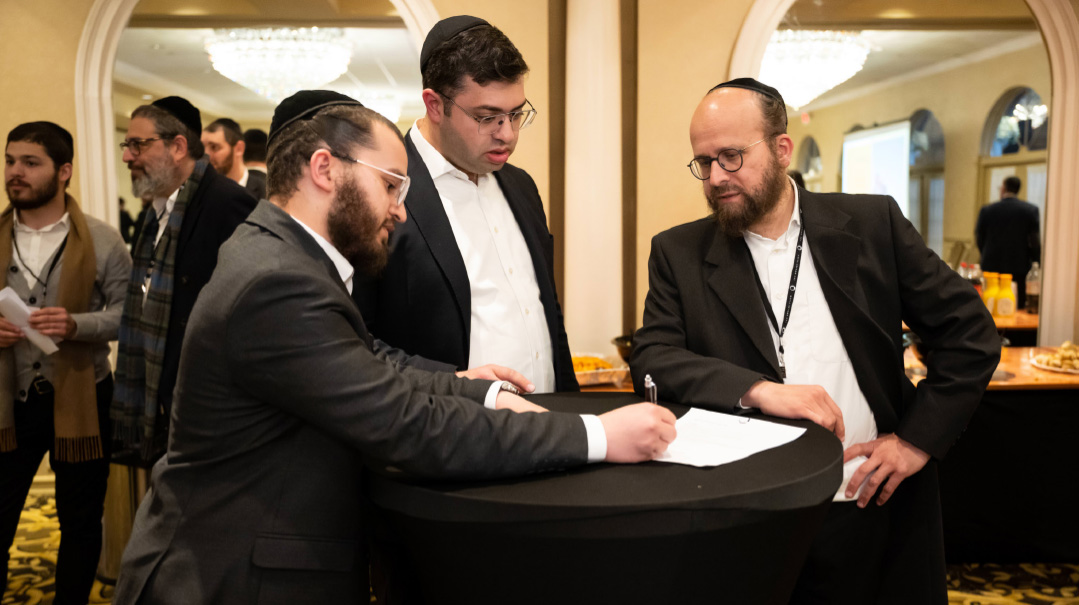
Giving it a Try
After the seminar breaks for lunch, everyone returns, still listening raptly. It’s now time to test out Robert’s method ourselves. Chad takes a volunteer from the audience to choose an area to invest in. The volunteer — let’s call him Baruch — decides he wants to check out Jersey Shore. Baruch is instructed to do an Internet search with the keywords “Must Sell,” “Motivated Seller,” or “For Sale by Owner.”
“You can eliminate the middleman,” Chad says. “If there’s no price listed, just call the owner. You can find the phone number through the address. When they say ‘no unsolicited calls,’ they usually mean you shouldn’t call to sell them something. But you can call to ask about the house.”
Robert notes that Zillow algorithms are often incorrect, so don’t take a Zillow price as set in stone.
Other good keywords are “TLC” (“that usually means the roof is bad,” Chad comments), “needs repairs,” or “remodeled.” Auction.com or hudzu.com are also resources to find properties up for auction.
Baruch finds two promising houses in Wildwood. He tries the numbers listed, but there’s no answer. He’ll have to follow up later.
Robert notes that his real estate formula doesn’t just work for private housing, but for commercial real estate as well: hotels, apartment buildings, shopping centers.
“Send a postcard or letter, then follow up with a phone call,” he advises.
Every day he commits to finding ten or fifteen promising ads for properties. He makes calls for one hour to follow up on them, logging his time and results. Tracking people down, he says, is often the most challenging part. If someone isn’t home, he leaves a phone message, several times if necessary, being sure to speak slowly and clearly (with millennials, he’ll leave a text, then send an email).
Robert stokes his audience’s appetite for success by making a Skype call to Shlomo, an American avreich living in Telz Stone with his family. Shlomo took Robert’s training, and now devotes four hours an evening to searching out investment opportunities and buying properties. It’s all done online from his home in Eretz Yisrael, and he’s supporting his family with relatively little effort while still putting in two full sedorim a day.
Shlomo began with a rental property in 2019. He’d been looking in the Cincinnati area, but found it had become too competitive, so he looked nearby instead. He found someone Jewish who connected him with an agent, and then put in an offer on a house. The offer was turned down by the owner, who happened to own 20 other houses.
Shlomo asked, “Do you know of any other properties for sale?” The answer was yes, and Shlomo ended up partnering with this man on package deals involving groups of houses.
“Today I’m closing on 13 houses at $50,000 a house,” he says. “Three of them are fully renovated, and they’re all occupied except two.”
Shlomo’s association with Project X has helped him deal with the details of financing. He does the negotiating, but his mentor runs the numbers for him. In the past four years, he’s done 74 real estate deals.
Shlomo’s experience highlights another essential piece of advice from Robert: If you’re not starting with a lot of money to invest, find a partner who will share the deal and the financial responsibility. You can offer your partners from 60 to 90 percent of the deal and still make money for yourself. There are Facebook groups of real estate investors, LinkedIn pages, and equity sharing deals (an advanced technique, he cautions). As an investor, you’ll probably want to partner with people who can help you find deals, including local partners familiar with the area you’re seeking to invest in, financial partners, contractors, and other professional and personal contacts.
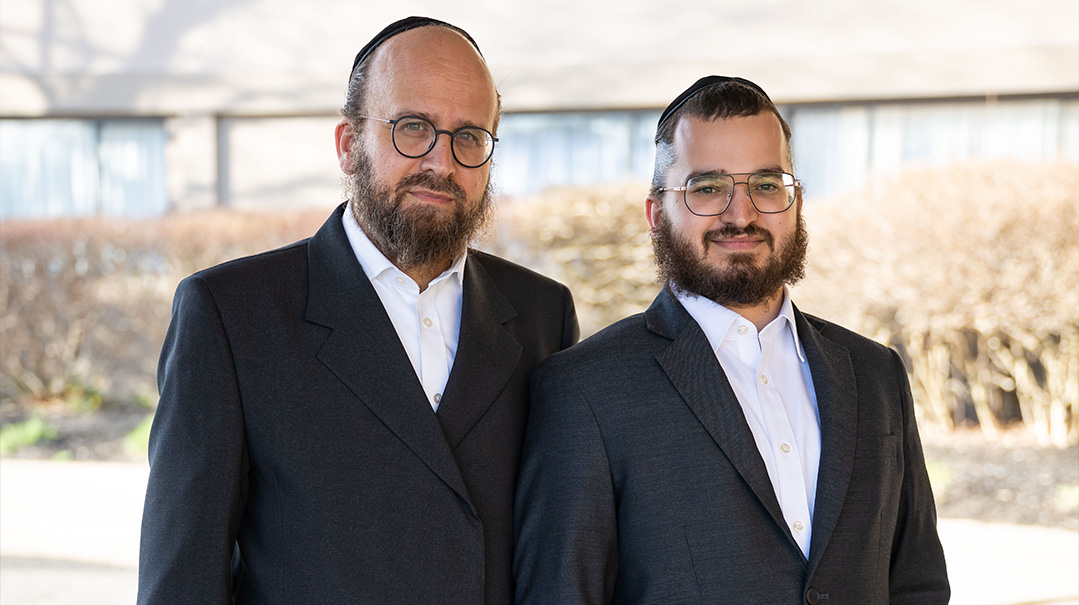
Father and son duo Zevi and Simcha Bennet are a Project X success story who benefited from Robert’s seminar and wanted to bring it to Toms River
Meet the Bennets
Father and son duo Zevi and Simcha Bennet, who brought Robert’s seminar to Mishpacha and Toms River, are another Project X success story. When they met Robert in 2019, they saw tremendous opportunity.
Zev is a trim, lively Gerrer chassid who grew up near Haifa in Hadar. When he married, he moved to Jerusalem, where he learned and opened a takeout store in Geula called Maadanei Zahav, which he still runs today.
“The celebrities would come in just for my father’s smile,” Simcha says. “He knew everybody by name. Rav Nosson Tzvi Finkel zt”l used to send bochurim to buy food from him, and politician Yankel Litzman used to say, ‘You know Shabbos is coming when you go into Zevi’s!’ ”
Simcha describes his father as an extremely smart, astute man, the kind of person both religious and nonreligious seek out for his wise counsel. He had already dabbled in some real estate on the side, but when someone told him about Project X, he realized that here was an approach with a precise, tried-and-true method.
By then Simcha had been married for a few years and was living in the US. He had started off learning in kollel , then bought a restaurant in Deal called Tapas, specializing in Spanish-American food. (“I bought it from someone else — that was the name and style of food it was known for,” he explains.)
But a couple of months later, his father called asking him to join in taking the Project X course in Israel.
“My father thought I could be the boots on the ground for us to invest together in the US,” Simcha says. “Even more, he knew how hard the food business is. He was hoping I wouldn’t have to work as hard as he did to earn money. He ended up encouraging me to do both the restaurant and real estate.”
Father and son took the course together, in English with Hebrew subtitles. They were very excited when their first deal succeeded: They flipped a property in Michigan in three months and made $9,000 more than the asking price. Excited, and feeling like they knew what they were doing now, they skipped a few steps in the Project X approach in their next venture. It was a mistake.
“We lost money,” Simcha says. “You have to follow the system exactly. Now I always consult with my mentor, who became a friend within a year. You need that guidance and a pair of professional eyes.
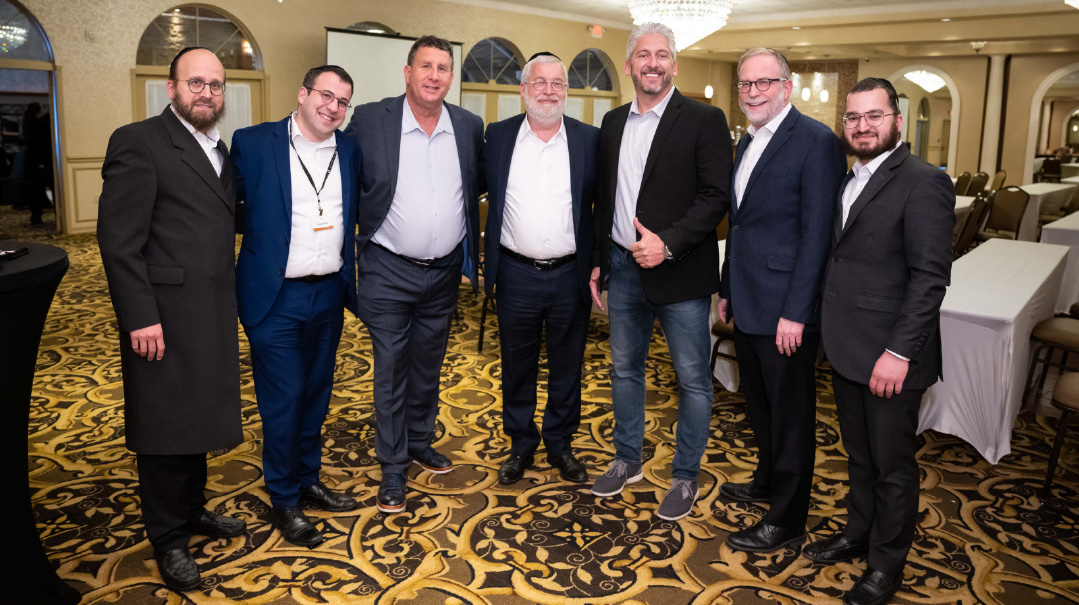
“The mentors walk hand in hand with you,” he says. “They won’t let you trip or fall. They help you find investors and contractors, and if you go to a different state, they provide you with people to speak to.”
“After a while you become a mentor yourself,” his father, Zevi, says. “You learn the mentality. You learn to take risks and you gain self-confidence.”
For a couple of Israelis whose English was still new, the mentors were invaluable for reading fine print on contracts and applying the right template for different states’ laws and systems. After learning their lesson on their second, unsuccessful deal, Zev and Simcha put in $20,000 for a few rental properties, and the business mushroomed from there.
“At the beginning, I felt like a young boy playing with the big boys,” Simcha confesses. “The family support was important; I was more scared than my father at first, worried about losing money. But the beauty of the system is that there’s always a Plan B.”
Zevi claims he was never afraid. “It takes time and effort, but it’s all about the numbers,” he says. “You try to buy below market value, increase its value, then flip or rent it. It’s the same system whether the property is $30,000 or $3 million.”
All his deals are in the US and made remotely, mostly in Michigan, Florida, and New Jersey, although he travels frequently to the US to visit Simcha and his family, as well as Simcha’s sister, who also lives with her family in Lakewood. (Zevi’s youngest child, recently engaged, is in Israel.)
“Don’t overthink,” Zevi advises. “Just find a good property and grab it. If the deal’s not good, so don’t do it. I met a 17-year-old in my first class who started buying property! Anyone can do it — a yungerman after seder, or a mother in the evening after she puts her kids to sleep.”
The Bennets and Robert make it seem so easy and simple, as if picking up properties is as easy as picking up seashells on a beach. The nitty-gritty, obviously, is a bit more complex. Getting to the finish line requires taking the course, putting in hours of research, phone calls, and paperwork, consulting with one’s mentor, and of course gumption and strong nerves. And a hefty dose of siyata d’Shmaya.
But for those who are willing to give it a shot, it could be very, very worth their while.
(Originally featured in Mishpacha, Issue 911)
Oops! We could not locate your form.













